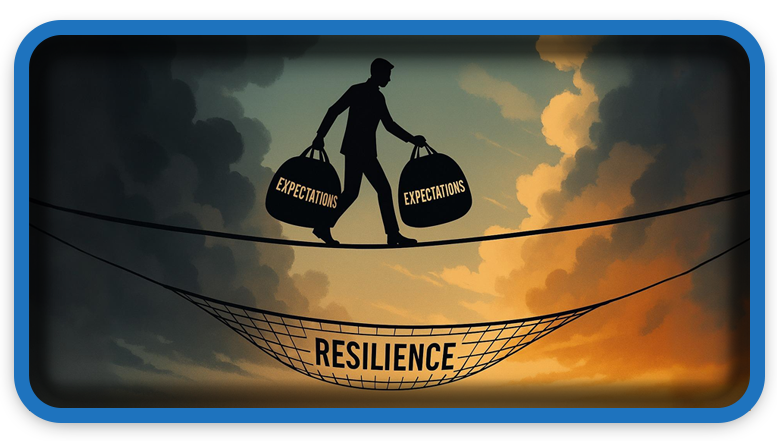⏲️ Estimated reading time: 6 min
High Expectations, Low Resilience: Why Ambition Without Flexibility Breaks Us. People with very high expectations often struggle to recover from setbacks. This article explores the psychology behind high standards, why they weaken resilience, and how to balance ambition with adaptability to achieve success without emotional burnout or disappointment.
Human beings thrive on goals, dreams, and ambitions. Setting expectations is a natural part of progress whether in personal life, relationships, or careers. However, there is a profound paradox: people with very high expectations often demonstrate very low resilience. They aim for the stars but struggle to cope when reality doesn’t align with their vision.
This isn’t about giving up ambition. It’s about understanding why perfectionism and rigid standards damage emotional strength, and how cultivating adaptability can help us bounce back from challenges. In this article, we’ll dive into the psychology, real-life examples, and practical strategies for striking the right balance.
The Nature of High Expectations
High expectations are usually rooted in:
- Perfectionism – believing only flawless outcomes are acceptable.
- Control mindset – needing every detail to match one’s vision.
- External validation – wanting recognition for success.
- Comparison trap – measuring worth by others’ achievements.
When expectations are extreme, they set up conditions where failure is almost guaranteed. Even small deviations from the “ideal” can feel catastrophic.

What Is Resilience?
Resilience is the ability to recover quickly from difficulties. It’s not about avoiding hardship but about:
- Maintaining emotional stability under stress.
- Adapting to unexpected outcomes.
- Learning from setbacks instead of being paralyzed by them.
Resilient people don’t avoid pain; they transform it into growth. They see failure as feedback, not a final verdict.
Why High Expectations Lower Resilience
1. The Fragility of Perfectionism
When someone sets a bar too high, anything below perfection feels like total failure. Instead of bouncing back, they spiral into self-doubt.
2. Rigid Thinking vs. Flexibility
Resilient people adapt when plans go wrong. Those with high expectations cling to the original plan, unable to pivot.
3. Disappointment Intensity
The emotional gap between “what I wanted” and “what I got” is much larger for people with high expectations, making the fall more painful.
4. Self-Worth Tied to Outcomes
If identity equals success, then failure equals worthlessness. This mindset destroys resilience.
Psychological Foundations
Psychologists have long studied the connection between expectations and resilience:
- Cognitive Behavioral Theory (CBT) suggests that distorted thinking (“I must succeed or I’m nothing”) creates emotional fragility.
- Learned Helplessness research shows that repeated disappointment leads to giving up easily.
- Mindset Theory (Carol Dweck) emphasizes the difference between a fixed mindset (fragile) and a growth mindset (resilient).
The Social Dimension
High expectations don’t just affect the self; they ripple into relationships:
- Parents with unrealistically high expectations can damage a child’s confidence.
- Partners with rigid expectations create resentment in relationships.
- Workplace perfectionism increases burnout, reduces collaboration, and makes teams brittle under pressure.
Case Studies
The Athlete Who Can’t Accept Defeat
Elite athletes often set impossible standards. Some thrive, but others collapse emotionally when they lose even after an outstanding performance.
The Student with Straight-A Standards
A student who equates self-worth with grades panics at a B+, despite still being above average. Stress overrides learning.
The Entrepreneur and the Failed Launch
Start-up founders with extreme expectations may interpret one failed product as personal ruin instead of a learning opportunity.
The Biology of Stress and Expectation
- Cortisol spikes when expectations aren’t met, triggering anxiety.
- Dopamine reward systems create a crash if the expected success doesn’t arrive.
- Neuroplasticity shows we can rewire responses to disappointment but only if we learn flexibility.
How to Balance Ambition with Resilience
1. Set Flexible Goals
Aim high, but allow a range of acceptable outcomes. Example: instead of “I must earn $100,000 this year,” say “I want to increase my income while building stability.”
2. Practice Self-Compassion
Forgive mistakes. Remind yourself: “Failure is feedback, not a final verdict.”
3. Reframe Disappointment
Shift focus from what went wrong to what can be learned.
4. Build Process-Oriented Thinking
Resilient people focus on effort and growth, not only on results.
5. Strengthen Emotional Agility
Meditation, journaling, and therapy can help process failure without breaking down.
Cultural Perspectives
Different cultures perceive expectations and resilience differently:
- Western societies often glorify perfectionism.
- Eastern philosophies (like Buddhism and Taoism) emphasize acceptance and balance.
- Indigenous traditions often see setbacks as part of the natural cycle of growth.
Learning from these perspectives can make ambition more sustainable.
The Dangers of Chronic High Expectations
Over time, inflexible expectations can lead to:
- Chronic stress
- Burnout
- Anxiety and depression
- Social isolation
- Physical health issues (high blood pressure, insomnia, weakened immunity)
Stories of Transformation
- The perfectionist CEO who nearly collapsed from stress but rebuilt resilience by delegating and lowering impossible standards.
- The college student who redefined success after academic burnout and discovered passion beyond grades.
- The parent who shifted from pressuring their child to supporting exploration, strengthening both resilience and the relationship.
Practical Exercises to Build Resilience
- Daily gratitude journaling – focus on progress, not just outcomes.
- Cognitive reframing – catch perfectionist thoughts and rewrite them.
- Micro-challenges – intentionally embrace small failures to strengthen tolerance.
- Support networks – talk through setbacks with trusted people.
Why Letting Go Creates Strength
Resilience isn’t built by holding on tighter; it’s built by loosening the grip. When we allow life to be imperfect, we paradoxically gain more control over our emotions and long-term outcomes.
Final Insights
High expectations aren’t inherently bad they push humanity forward. But when unchecked, they become a prison. True resilience lies not in lowering ambition but in balancing it with flexibility, acceptance, and self-compassion.
Those who master this balance can dream big, fall hard, and still rise stronger.
🔔 For more tutorials like this, consider subscribing to our blog.
📩 Do you have questions or suggestions? Leave a comment or contact us!
🏷️ Tags: resilience psychology, high expectations, perfectionism, emotional strength, mental health, personal growth, success mindset, stress management, ambition, coping strategies
📢 Hashtags: #Resilience #HighExpectations #MentalHealth #Perfectionism #SelfGrowth #Mindset #EmotionalStrength #PersonalDevelopment #StressRelief #LifeBalance
Only logged-in users can submit reports.
Discover more from HelpZone
Subscribe to get the latest posts sent to your email.

